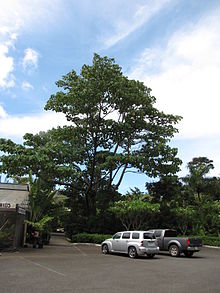Balsa wood
| Ochroma | |
|---|---|
 |
|
| Ochroma pyramidale at the Large tree habit at Tropical Gardens of Maui, Iao Valley Road, Maui, Hawaii, United States | |
| Scientific classification | |
| Kingdom: | Plantae |
| (unranked): | Angiosperms |
| (unranked): | Eudicots |
| (unranked): | Rosids |
| Order: | Malvales |
| Family: | Malvaceae |
| Subfamily: | Bombacoideae |
| Genus: |
Ochroma Sw. |
| Species: | O. pyramidale |
| Binomial name | |
|
Ochroma pyramidale (Cav. ex Lam.) Urb. |
|
| Synonyms | |
|
Bombax pyramidale Cav. ex Lam. |
|
Bombax pyramidale Cav. ex Lam.
Ochroma bicolor Rowlee
Ochroma concolor Rowlee
Ochroma lagopus Sw.
Ochroma obtusum Rowlee
Ochroma is a genus of flowering plants in the mallow family, Malvaceae, containing the sole species Ochroma pyramidale, commonly known as the balsa tree. It is a large, fast-growing tree that can grow up to 30 m (98 ft) tall. Balsa wood is a very lightweight material with many uses. Balsa trees are native to southern Brazil and northern Bolivia, up to southern Mexico.
A member of the mallow family, O. pyramidale is native to southern Mexico to southern Brazil, but is now found in many other countries (Papua New Guinea, Indonesia, Thailand, Solomon Islands). It is a pioneer plant, which establishes itself in clearings in forests, either man-made or where trees have fallen, or in abandoned agricultural fields. It grows extremely rapidly, up to 90 ft (27 m) in 10–15 years. The speed of growth accounts for the lightness of the wood, which has a lower density than cork. Trees generally do not live beyond 30 to 40 years.
Flowers are produced from the third year onwards, typically at the end of the rainy season when few other trees are in flower. The large flowers open in the late afternoon and remain open overnight. Each may contain a pool of nectar up to 1 in (2.5 cm) deep. Daytime pollinators include capuchin monkeys. However most pollination occurs at night. It was once thought that the main pollinators were bats; however recent evidence suggests that two nocturnal arboreal mammals, the kinkajou and the olingo, may be the primary pollinators.
Ecuador supplies 95% or more of commercial balsa. In recent years, about 60% of the balsa has been plantation-grown in densely packed patches of around 1000 trees per hectare (compared to about two to three per hectare in nature). It is evergreen or dry-season deciduous, with large (30–50 cm or 11.8–19.7 in) weakly palmately lobed leaves. Being a deciduous angiosperm, balsa is classified as a hardwood despite the wood itself being very soft. It is the softest commercial hardwood. The trees are harvested after six to 10 years of growth. The name balsa comes from the Spanish word for "raft".
...
Wikipedia
